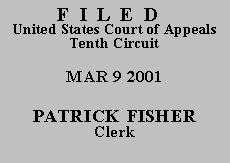

| BARRY B. BROWN, |
|
| v. | |
| TERRY B. FETTKE and GREG GORES, |
Barry B. Brown, proceeding pro se, brought this action under 42 U.S.C. § 1983 to recover damages for the alleged violation of his rights under the Fourth and Fourteenth Amendments. The district court dismissed Mr. Brown's action as time barred. Because this claim, even if timely, would be foreclosed by the Supreme Court's decision in Heck v. Humphrey, 512 U.S. 477 (1994), we affirm.
This action arises out of a police entry into Mr. Brown's residence in 1993, which led to his conviction on drug charges. On September 20, 1993, Officer Terry Fettke and Officer Greg Gores of the Wichita Police Department effected a traffic stop of Arnold Haywood. When Mr. Haywood could not produce identification or a driver's license, the officers permitted him to drive to Mr. Brown's residence (with the officers following) in order to obtain it. Mr. Brown answered the door to the residence. The officers entered the residence and then followed Mr. Haywood into a bedroom as he searched for the identification. In the bedroom, the officers spotted drugs in plain view, and arrested both Haywood and Brown. Mr. Brown argued that these events constituted an illegal search, but lost at trial, see United States v. Brown, 902 F. Supp. 1410 (D. Kan. 1995); on direct appeal, see United States v. Hayden, 108 F.3d 341, 1997 WL 82475 (10th Cir. 1997) (unpublished disposition); and on a motion for postconviction relief, see United States v. Brown, 993 F. Supp. 1338 (D. Kan. 1997).
In his motion for postconviction relief, Mr. Brown raised for the first time the claim that the police had violated department policy in allowing Mr. Haywood to drive to Mr. Brown's house without a license. Mr. Brown argued that this action infringed upon his Fourth and Fourteenth Amendment rights, but the district court found that he lacked standing to contest the constitutionality of Mr. Haywood's detention by the police. Brown, 993 F. Supp. at 1340.
Following that dismissal, Mr. Brown then filed this pro se § 1983 claim, alleging that the officers' actions were in violation of the department policy and had led to the violation of his Fourth and Fourteenth Amendment rights. The district court found that Mr. Brown's § 1983 claims were time barred. Citing Johnson v. Johnson County Commission Board, 923 F.2d 1299 (10th Cir. 1991), the court ruled that because Mr. Brown's counsel had already challenged the legality of the residential search in the earlier proceedings, Mr. Brown "failed to overcome the presumption that his claim for damages accrued" at the time of his arrest in 1993. Rec. doc. 6 (Dist. Ct. Order, filed March 13, 2000, at 2) (citing Johnson, 923 F.2d at 1301).
Mr. Brown now appeals, arguing that he was unaware of the officers' violation of department policy until 1997, when he obtained a copy of that policy from the Wichita Police Department. Mr. Brown alleges that as his § 1983 action is premised upon that policy violation, and was filed less than two years after he became aware of that violation, it should be deemed timely.
After reviewing Mr. Brown's pleadings and the applicable case law, we find that Mr. Brown's § 1983 action, even if timely, would be barred by the Supreme Court's decision in Heck v. Humphrey, 512 U.S. 477 (1994). As a result, we find it unnecessary to reach the legal question of whether Mr. Brown's 1997 discovery of the relevant police regulation overcame the district court's determination that his cause of action accrued in 1993.
In Heck, the Supreme Court held that
in order to recover damages for allegedly unconstitutional conviction or imprisonment, or for other harm caused by actions whose unlawfulness would render a conviction or sentence invalid, a § 1983 plaintiff must prove that the conviction or sentence has been reversed on direct appeal, expunged by executive order, declared invalid by a state tribunal authorized to make such determination, or called into question by a federal court's issuance of a writ of habeas corpus . . . . [Thus, a court] must consider whether a judgment in favor of the plaintiff would necessarily imply the invalidity of his conviction or sentence; if it would, the complaint must be dismissed unless the plaintiff can demonstrate that the conviction or sentence has already been invalidated. But if the district court determines that the plaintiff's action, even if successful, will not demonstrate the invalidity of any outstanding criminal judgment against the plaintiff, the action should be allowed to proceed, in the absence of some other bar to the suit.
Id. at 486-87 (footnotes and citation omitted).
If Mr. Brown could successfully sue the officers for infringing upon Mr. Haywood's rights by violating police procedure, he might have been able to avoid Heck. However, § 1983 may only be used to sue defendants who have directly injured the plaintiff. Thus, any action by Mr. Brown against the police must be based on a direct injury to Mr. Brown, and not on an alleged prior violation of Mr. Haywood's rights.
Here, the only possible source of direct constitutional injury to Mr. Brown is the entry into his residence. On the facts of this case, if that entry were illegal, it would necessarily call into question the validity of Mr. Brown's conviction. Heck therefore prohibits Mr. Brown from filing any § 1983 action as long as his conviction stands. We AFFIRM the district court's dismissal of Mr. Brown's § 1983 action.
Entered for the Court,
Robert H. Henry
Circuit Judge
*. This order and judgment is not binding precedent, except under the doctrines of law of the case, res judicata, and collateral estoppel. The court generally disfavors the citation of orders and judgments; nevertheless, an order and judgment may be cited under the terms and conditions of 10th Cir. R. 36.3.